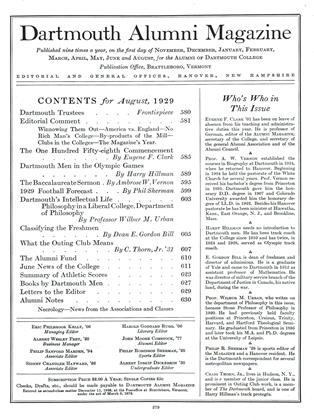It is my deliberate opinion that if your own soul permits you to adopt as your life slogan: "Take the nobler risk," the great problem of religion which confronts us all in this time of confusion will be at once settled.
No one has ever seen God or can tell you what He is or altogether how He works or quite what He means to do with us. In fact we are all of us poignantly aware that no one can demonstrate that there is a God at all. Science and philosophy leave the way open for religion and all the deeper experiences of men call for it, but as the Bible has long ago assured us, without faith, it is impossible to please God or even to reach Him. And faith implies facing the greatest of all risks and taking it. You must live either as though there were God, a great constraining power, making for a noble end and bound to reach it, or else as though there were no such directive, cooperative principle in the universe and that life therefore has no high and sacred meaning. Now, if what I have been saying seems to you true, if the manly fashion of living is to take a noble risk rather than to await a never-dawning certainty, then there can be no question of the risk that we should take. It is far nobler to take the religious risk than to take the irreligious one. Then take it. And if we take it, we shall take it as followers of Christ. I do not mean that we shall regard him as the second person of a mysterious deity. I do not mean that we should necessarily think of him as he thought of himself or that we should slavishly submit to the precepts of the sermon on the moUnt. I do not even mean that our picture of God should be his picture of God. I mean that our attitude to God—to the inscrutable power that has produced, quickened, empowered and guided our lift —should be so full of childlike trust and gratitude that the way of love shall become our way of life.
That is the supreme risk—to live not for comfort or for fame but for service, to shut the door upon thoughts of self and open it upon your fellows, to disdain any organization that thrives upon exclusiveness; to spend yourself loyally for the institutions which make for brotherhood and truth in the world, even when you disapprove of their immediate aims and methods; to build only the lowest of fences about your home and your country, to look out for your neighbor if not with as much constancy still with deeper delight than for yourself; to refuse to defend yourself or to let a friend go undefended; to bear suffering rather than inflict it, to outlaw every grudge; to feel bitter humiliation when the fang of envy rises in the heart; to spend more thought on giving than on receiving, on knowing than on getting known; to recognize money and time as sacred trusts rather than as private playthings; to reject any plan which permanently withdraws you from human service for the sake of personal pleasure; to deck your life with beauty and joy and throw it open toward the wide possibility of eternity; to take your stand definitely with the oppressed rather than with the oppressors, with the ostracized rather than with the exclusive, but to be prepared to serve them both; to let mirth have the right of way over pride but to hush it in the presence of earnest thought or deep sorrow, to be friendly, if possible even toward the bigoted and the cynical and the snobbish; to put your character at the disposal of love as utterly as marble is placed under the chisel of the sculptor—this, fellow-students, fellow men of Dartmouth, fellow seekers after God, is taking the supreme risk. No matter how sincerely, how wholeheartedly you take it, it will never lose its element of risk, of venture, of heroism, but the longer and the more consistently you take it, the more confident you will become that you have sailed a straight course in a time of uncertainty.
There is a stanza of a comparatively obscure English poet with which I shall close this address which you have asked me to give. It owes its growing favor solely to its simple and important truth. "To every man there openeth A way and ways and a way, And the high soul climbs the high way And the low soul gropes the low; And in between on the misty flats, The rest drift to and fro. But to every man a high way and a low, And every man decideth the way his soul shall go."
 View Full Issue
View Full Issue
More From This Issue
-
 Class Notes
Class NotesCLASS OF 1879
August 1929 By Henry Melville -
 Article
ArticleAlumni Council Meetings
August 1929 -
 Article
ArticleThe One Hundred Fifty-Eighth Commencement
August 1929 By Eugene F. Clark -
 Class Notes
Class NotesCLASS OF 1899
August 1929 By Warren C. Kendall -
 Class Notes
Class NotesCLASS OF 1903
August 1929 By John Crowell -
 Class Notes
Class NotesCLASS OF 1918
August 1929 By Frederick W. Cassebeer
Ambrose W. Vernon
-
 Article
ArticleThe Baccalaureate Sermon
AUGUST 1929 By Ambrose W. Vernon -
 Article
ArticleHeritage of the Past
AUGUST 1929 By Ambrose W. Vernon -
 Article
ArticleTwo Courses Open
AUGUST 1929 By Ambrose W. Vernon -
 Article
ArticleResults of Risks
AUGUST 1929 By Ambrose W. Vernon -
 Article
ArticleDiscrimination in Risks
AUGUST 1929 By Ambrose W. Vernon -
 Article
ArticleTake the Nobler Risk
AUGUST 1929 By Ambrose W. Vernon








